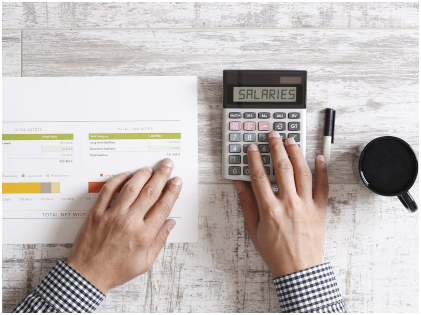
Here’s How You Can Survive Real-World Budgeting

Adulthood is considered by many as one of the most enjoyable and exciting times in an individual’s life. Getting out of school, grabbing the first job, and being on your own is hailed as an important milestone, which is unforgettable. This phase signifies that you are not a kid anymore. But, the excitement begins to die down as soon as reality strikes.
You realize that life is nothing but a roller coaster ride, and you would have to wade through all the ups and downs. One of the toughest things to do during this phase is to manage your finances properly. Why is that? Budgeting and getting to know how to handle money matters is a challenge. To cope with that challenge, here are a few points that might be of some help.
Be Aware Of How Much Your Take-Home Is
 After you get the first job, your employer offers you a salary. Suppose you will be receiving $36,000 every year. Now, does that imply that your monthly take-home will be $3000? No. This is where you make a mistake.
After you get the first job, your employer offers you a salary. Suppose you will be receiving $36,000 every year. Now, does that imply that your monthly take-home will be $3000? No. This is where you make a mistake.
When you get your first paycheck, there are several expenses such as social security income, health insurance, state and federal taxes, and some more, that will be deducted from your monthly income. All these expenses can add up to something around 25% of your gross pay. Therefore, if you are not aware of this and fail to calculate your take-home amount, budgeting will be an uphill task for sure.
You Need To Know Your Expenses
When you start living alone, away from your parents, you have everything new in front of you. The situation can get challenging. You need first to understand the expenses you might have to incur and how much you need to shell out for each one of them. Essential expenses like paying the house rent, food costs, paying the electricity bills, etc. If you want to know how much you would have to shell out on rent, it is always best to keep 30% of your total income aside.
That said, where you are staying is also a key factor to consider. In case you have chosen a posh neighborhood in a metropolitan city, the percentage is most likely to creep higher. Then comes your food expenses. If you haven’t paid to a grocery store yet, your first step should be listing out all the necessities that you need to have. You can buy it weekly. Assessing the costs would help you set a budget for yourself.
Getting Organized Is Important
 Without getting organized, you won’t ever be able to manage your finances. Keeping track of where your money is going is of absolute importance. Once you start doing it, you will have a basic idea of how much you are spending and what are areas you are spending your money on. The majority of people fail to keep track of their small expenses. Remember, several small expenses can add up to large expenditures in the long run.
Without getting organized, you won’t ever be able to manage your finances. Keeping track of where your money is going is of absolute importance. Once you start doing it, you will have a basic idea of how much you are spending and what are areas you are spending your money on. The majority of people fail to keep track of their small expenses. Remember, several small expenses can add up to large expenditures in the long run.
Start a spreadsheet where you can put in every expense that you have had. There are a host of tools that you can use. On Google Playstore and any other app marketplace, you can find a plethora of personal finance management apps that have gained wide currency among younger people. This is because these apps make money management easy for the end-users – most of whom are young people. Just integrate anyone of your choice with your bank account as well as your credit card account.
Save As Much As You Can
 Starting a new phase of life and being independent is, of course, exciting. This is the period when you will feel the urge to splurge on things that love and spend money as if there is no tomorrow. This will put you in a rather disadvantageous position later on. It’s important to live within whatever means you have.
Starting a new phase of life and being independent is, of course, exciting. This is the period when you will feel the urge to splurge on things that love and spend money as if there is no tomorrow. This will put you in a rather disadvantageous position later on. It’s important to live within whatever means you have.
Initiating proper financial habits is a must if you want your money to be in order. You can also start an emergency fund. Put in money there whenever you get the opportunity. This emergency fund will come in handy whenever you feel that you are running short of money, and you have to pay for a necessity.
Keep in mind that an emergency fund is for those times when your financial prospects worsen or when you have an urgent financial need. Otherwise, set your money aside in that fund and just forget about it.
More in Business & Investments
-
`
The Sky’s the Limit: Qantas Aims for Ultra-Long-Haul Records
Long-haul flights are making a grand return, signaling the optimism among airlines that international travel is on the rebound post the...
December 2, 2023 -
`
WWE SmackDown to Make a Comeback on USA Network in 2024
In a surprising twist, WWE’s Friday night staple, “SmackDown,” is bidding farewell to Fox and heading back to its old stomping...
November 24, 2023 -
`
Why Women Face Higher Out-of-Pocket Health Expenses
In healthcare, disparities persist, and a recent report from Deloitte underscores a significant financial gap between working women and men in...
November 18, 2023 -
`
Elon Musk vs Bill Gates: The Clash of Titans
In the realm of the world’s wealthiest individuals, a simmering rivalry has been captivating public attention. It’s not a clash of...
November 7, 2023 -
`
The Power Of Disconnecting
In our digitally driven age, where smartphones, tablets, and laptops have become extensions of ourselves, disconnecting might seem daunting. However, the...
October 31, 2023 -
`
JCPenney’s Bankruptcy: The End of an Era
JCPenney filed for bankruptcy in a move echoing the struggles of many retailers in the wake of the COVID-19 pandemic. This...
October 26, 2023 -
`
Reasons Why You Need a Financial Plan
Financial planning is not just for the wealthy or those nearing retirement. It’s a crucial tool for anyone seeking financial security...
October 19, 2023 -
`
How Brad Pitt Spends His Millions All Over the World
Brad Pitt, the charismatic Hollywood superstar, has left an indelible mark on the silver screen and made an impact in the...
October 10, 2023 -
`
Gen Z’s Posh Palate: The Unexpected Rise of Caviar Culture
Amid the backdrop of a digital era buzzing with viral dances, e-sports, and niche memes, there emerges a peculiar plot twist:...
October 7, 2023















You must be logged in to post a comment Login